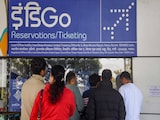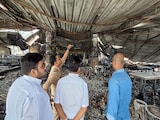- Kabul extracts 44 million cubic metres more groundwater annually than replenished
- Nearly half of Kabul's boreholes have already dried up due to over-extraction
- Up to 80 per cent of Kabul's groundwater is contaminated, causing health issues
Kabul, the capital of Afghanistan, is facing a severe crisis that could see it become the first modern capital in the world to run out of water, according to a report by Mercy Corps. Years of over-extraction, rapid population growth, climate change, and mismanagement have pushed the city's groundwater reserves to critical levels.
The city now extracts 44 million cubic metres more groundwater each year than is naturally replenished. Nearly half of Kabul's boreholes have already dried up. Experts warn that if current trends continue, the city could exhaust its groundwater supply entirely by 2030.
Kabul, which had fewer than two million residents three decades ago, has seen its population swell since 2001. The demand for water has surged alongside, but groundwater, which the city relies on almost exclusively, is being extracted far faster than it can be naturally replenished.
The crisis is not only a matter of water scarcity but also one of public health, and humanitarian concern. Up to 80 per cent of Kabul's groundwater is contaminated, leading to residents getting sick.
"Diarrhea and vomiting are problems people experience all the time in the city," a 36-year-old government employee living in the Taimani district told CNN. He said his family often gets sick after drinking water from restaurants or brushing their teeth at home.
Many families are forced to sacrifice food and other necessities to buy water or dig expensive wells, the same water that often remains unsafe to drink.
Those unable to dig private wells rely on water tankers or travel long distances to collect water from mosques.
"We don't have access to (drinking) water at all," said a 42-year-old mother of four. "Water shortage is a huge problem affecting our daily life." Women in particular face increased hardship. Under Taliban restrictions, they must be accompanied by a male guardian to go outside.
Climate change is worsening the problem. Snowmelt from the Hindu Kush mountains, which used to recharge Kabul's aquifers, has significantly declined, replaced by unregulated flash floods from irregular rainfall.
The situation has been worsened by political instability and a sharp decline in foreign aid following the Taliban's return to power in 2021. A freeze on US assistance, including USAID funding, has stalled critical water and sanitation projects.
UNICEF earlier projected that Kabul could exhaust its groundwater supply by 2030 if current trends persist.















